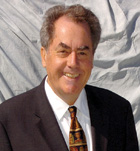
Given the sky-high gas prices and the overall dismal state of the economy, some could say now’s not the best time to be touring the country with a mileage-robbing Airstream trailer. But Stephen Moses, who’s been on the road all of 2008—and has logged more than 20,000 miles with the “Silver Bullet” during the first nine months of the year—has far more important things to worry about than what he’s paying at the pump.
He’s president of the Center for Long-Term Care Reform, a nonprofit Seattle-based organization he operates with his wife, Judith, and 32-year-old son, Damon. And he’s focusing his efforts on the grim financial state of Medicaid.
What does he want? To keep Medicaid available for those who truly need it, while encouraging more financially secure seniors to embrace private financing.
“We have a public that’s anesthetized to the risk of long-term care and a provider industry that’s depending on financing from a government [program] that’s essentially bankrupt,” Moses stressed. “We need to get everyone to look through the windshield at what’s coming instead of through the rearview mirror at the way long-term care’s been financed in the past.”
It’s a tall order, and certainly one the government hasn’t actively pursued, Moses says—despite his hard-fought efforts as a U.S. government employee. His nearly decade-long stint as a Medicaid state representative for the Health Care Financing Administration (now the Centers for Medicare & Medicaid Services) opened his eyes to how Medicaid operates, he says.
It isn’t as the welfare program it was intended to be, but rather as a financing program for virtually anyone who could creatively hide his or her assets. Puzzled and alarmed, Moses began writing policy papers on the subject for HCFA and then continued those efforts as senior analyst for the Inspector General of the U.S. Department of Health and Human Services–work that helped forge some of the framework for the Omnibus Budget Reconciliation Act of 1993.
Having testified before Congress and two-thirds of America’s state legislatures, Moses says he also was instrumental in the content development and passage of the Deficit Reduction Act of 2005, which discouraged Medicaid planning abuses.
Despite his many accomplishments at the government level, Moses says he often felt hamstrung in those roles. He moved to the private sector, where he thought he could have a more direct impact. Many agree he’s just the man to do it.
“Steve introduced me to the scary swamp monster otherwise known as America’s LTC financing system,” notes David Rosenfeld, who co-founded the Center for Long-Term Care Reform with Moses in 1998. “Steve is curious by nature. He loves to figure things out, and usually does.”
Described as easygoing and disarming by his son, who works as the Center’s administrative coordinator, Moses was never one to keep his passion for long-term care policy to himself.
“I grew up with him working for the government, and he’s always been very passionate about long-term care issues, so I’ve been around that for a big part of my life,” Damon says.
The elder Moses’ own upbringing was more akin to a Norman Rockwell painting. The only child of an auto parts store owner and homemaker mother, he grew up in the Northern California olive-growing town of Corning. There he developed an early love of books, which he still enjoys today. He also appreciates fine theater and opera, loves to travel, and is fluent in Spanish, thanks, in part, to a two- year stint in Venezuela for the Peace Corps during the late 1960s.
“Everything I’ve done has led me to this place, and right now, there’s nothing else I’d rather be doing.” he says. “No one else would be crazy enough to spend so much time on this, but it’s worth it because I can see the impact we’re having. I always said that no matter what it takes, I’m taking this ball over the goal line, and I’m not stopping before then.”
_____
Resume
1967
Earns Bachelor of Arts degree in political science from University of California, Davis
1968-70
Does stint as Peace Corps volunteer in Venezuela
1972
Receives Master of Arts degree in political science from University
of Maryland, College Park
1975-78
Serves as HCFA Medicaid state representative
1978-87
Works as senior analyst for Inspector General of the U.S. Department of Health and Human Services
1989-98
Takes position as director of research for insurance brokerage firm LTC Inc.
1998-present
Assumes role as president for the Center for Long-Term Care Reform ñ
From the November 01, 2008 Issue of McKnight's Long-Term Care News




